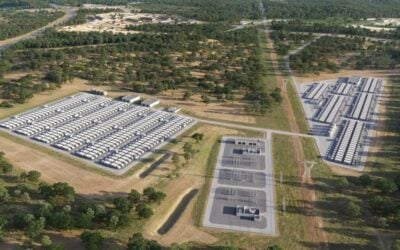Green Charge Networks CEO Vic Shao (second from right) at the ribbon cutting for a recent project. Image: Green Charge Networks Facebook page.
Silicon Valley’s Green Charge Networks, which mainly delivers energy storage systems for commercial customers and is involved in a deal to re-purpose ‘second life’ EV batteries, has been acquired by Engie.
The French utility and independent power producer, formerly known as GDF Suez, has a presence in around 70 countries and has purchased an 80% stake in Green Charge for an undisclosed sum. Engie has already invested around US$6 million in Advanced Microgrid Solutions (AMS), another company in the US commercial and industrial (C&I) energy storage sector, one largely driven by helping customers reduce demand charges, which mean businesses’ power bills are pegged to their peak electricity usage each month. AMS is led by former California Public Utilities’ Commission (CPUC) chief Susan Kennedy and numbers actor Arnold Schwarzenegger among its other investors.
Enjoy 12 months of exclusive analysis
- Regular insight and analysis of the industry’s biggest developments
- In-depth interviews with the industry’s leading figures
- Annual digital subscription to the PV Tech Power journal
- Discounts on Solar Media’s portfolio of events, in-person and virtual
Green Charge Networks is led by CEO Vic Shao, who has a background in cloud computing and has run the company since he co-founded it in 2009. His company claims its lithium-ion energy storage system, Greenstation, can reduce customer demand charges by as much as 50% and made headlines in January when it raised US$20 million in non-recourse project finance from speciality financier Ares Capital Corporation as well as a US$30 million accordion facility. The company also signed a deal in June last year with embattled renewables developer SunEdison, which is now under bankruptcy protection.
Green Charge is also among companies eyeing the potential of re-purposing EV batteries. It announced last summer that it had a deal in place with Nissan for supplies of batteries from its Leaf EV to use in commercial storage. Yesterday, Nissan launched a pilot of a new vehicle-to-grid project in Britain, as well as a further drive to use re-purposed batteries from electric cars in storage systems.
Shared costs and benefits in PEA business model
That funding was said to be earmarked for the expansion of Green Charge’s Power Efficiency Agreement (PEA) portfolio, a business model where Green Charge owns, installs and operates a behind-the-meter storage system on a customer site. In return, Green Charge and the customer share the demand charge savings. According to the company’s website, the PEA can be used in conjunction with solar PV, EV chargers and energy efficiency programmes.
In a feature towards the beginning of the year for Energy-Storage.News’ sister publication PV Tech Power, Cosmin Laslau, an analyst with Lux Research, said cost reductions and innovations in the industry this year might be driven primarily by developments in financing structures and new business models.
Green Charge will benefit from its new owners’ “larger family” of businesses in North America, which includes retail energy sales to homes and businesses, as well as natural gas-fired power production and other segments, Engie said. The utility, meanwhile, will immediately gain “a strong position in the growing battery storage market in the U.S. and further develops its offering of load management solutions at customer sites,” from the acquisition, Engie CEO Isabelle Kocher said.
“Together with Green Charge, we are able to offer an even greater range of leading-edge solutions for commercial, industrial, and public sector customers. This acquisition will also reinforce ENGIE’s strengths and skills in the activities of decentralized energy management, off-grid solutions and power reliability, which are identified as areas for growth for the Group around the world,” Kocher said.
Engie is the rebranded name of GDF Suez. Image: Engie / GDF Suez.
Engie’s interest mirrored by other big names
As well as Green Charge and Advanced Microgrid, Engie has also invested in energy management software firm Tendril (in which PV company SunPower has also previously invested), and Opterra Energy Services, an energy management and sustainability specialist.
Engie’s swoop for Green Charge is the latest in a line of big, multi-national names taking a stronger interest in storage. Total is eyeing the acquisition of battery and storage system maker Saft, while engineering giant Lockheed Martin has started producing both lithium-ion and flow batteries, to name just two recent examples.
Vic Shao, meanwhile, said in a statement on the Green Charge website that his company was “thrilled to announce the deal”.
“This transaction accelerates our mission to use energy storage to power the world efficiently and sustainably. ENGIE shares our vision that energy storage will change the way we generate and consume energy,” Shao wrote.






